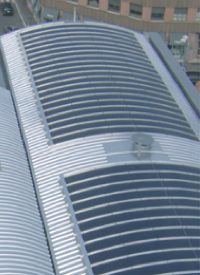
Adding to the growing list of failed "green" energy companies, another solar firm filed for Chapter 11 bankruptcy on Tuesday in hopes of selling off its solar power subsidiaries and other assets. Energy Conversion Devices Inc. (ECD), a Michigan-based manufacturer of thin-film solar laminates (product shown at left), said it will continue to operate through the bankruptcy and sale process.
Through its subsidiaries Uni-Solar (USO) and Solar Integrated Technologies, the firm develops solar projects and manufactures solar laminates for rooftops and buildings. "We firmly believe there is a strong and sustainable commercial market for Uni-Solar products," ECD CEO and President Julian Hawkins affirmed in a statement. "However our current capital structure and legacy costs are preventing USO from making the investments necessary for the future of the business without restructuring through the bankruptcy process."
Company officials stated that ECD sold its Ovonic Battery Co. to BASF Corp. for $58 million, and the subsidiary’s 35 employees have already been hired by BASF. The solar company retained investment firm Quarton Partners to help administer the sale process, which is expected to be completed in the next three months.
ECD was founded in Detroit more than 50 years ago, and before establishing Uni-Solar — the laminate arm of the firm — the company manufactured nickel-metal-hydride batteries for hybrid and electric vehicles. Uni-Solar became a leading global producer of solar laminates for industrial and commercial buildings, and expanded its operations with four new Michigan-based plants.
But in November, ECD suffered from rising inventory levels which led to a suspension in manufacturing and the announcement of 500 employee layoffs. Experts asserted that the high inventory levels and financial hardship were largely due to a worldwide surplus of solar panels, diminishing solar energy incentives in Europe, and a tremendous rise in foreign and domestic competition. "Ultimately, their cost structure has been deemed unsustainable for a while, and the effects of the market in 2011 just exacerbated it," Shayle Kann, a solar analyst with GTM Research, alleged.
ECD’s financial collapse will be tallied as the fourth major bankruptcy in the solar industry in the past year, behind Solyndra, Evergreen Solar, and SpectraWatt, which have also sought Chapter 11 bankruptcy protection.
Morningstar analyst Stephen Simko, who predicted the company’s financial demise, said the sale will prompt little interest given the company’s poor profitability and its uncompetitive cost structure. "This is going to be a pennies-on-the-dollar kind of sale," he estimated.
Similar to Solyndra’s federal backing (albeit on a smaller scale), Uni-Solar collected a $13.3-million investment tax credit as part of President Obama’s economic stimulus plan. "We are very appreciative of the Obama administration’s efforts to support American clean technology through the stimulus program," former EDC President Mark Morelli said at the time.
According to some critics, such as Jerome Schmitt, writing for American Thinker, the Energy Department’s cash infusions have saturated the solar industry, leading to widespread failures in the energy sector:
Vast tranches of DOE-money have been released by the Democrats into politically-connected "renewable energy" companies, ostensibly in order to subsidize industries manufacturing solar energy generating photovoltaic cells. One consequence of this giant injection of cash into a fragile and limited market is that existing market participants, companies that may have long pioneering track-records in the industry, suddenly must face vastly subsidized competition from the likes of Solyndra.
Let’s remember that there are many applications of solar cells that do not require subsidies, so there is a base market in the silicon-cell product. Into this small market is dumped courtesy US taxpayer vast quantities of cut-price product distorting the market vastly in favor of customers of ALL market entrants including the legacy companies.
And much as they did with other green energy companies, Democrats and the Obama administration touted Uni-Solar for its potential job creation and innovative business model. In fact, on the Democratic Policy Committee’s website, under a page entitled, "The Recovery Act: Success Stories in the States," Energy Conversion Devices is listed as one of the great "success stories" for the Michigan economy.
But as droves of other government-sponsored failures reveal, government intervention in the private sector corrupts business and spurs an artificially-stimulated market that can open the door to a complete breakdown of industries. And ECD’s financial demise is yet another example.



